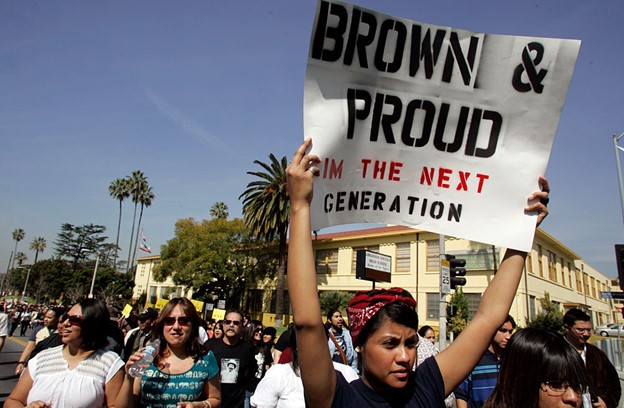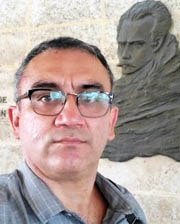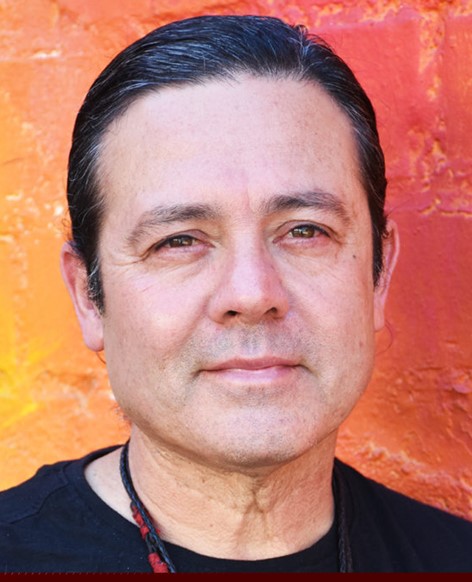|
|
|
|
The weekly newsletter of the México Solidarity Project |
|
|
|
May 11, 2022/ This week's issue/ Meizhu Lui, for the editorial team |
|
|
Annie Wells/Los Angeles Times |
|
Morena to Migrants: Help Us Transform México |
|
Mexicans who live in the United States, we all know, care deeply about immigrant rights. But Mexicanos and Chicanos also care about a broad range of other hot-button US policies. In state after state, for instance, our racist right has recently been passing legislation that bans the teaching of anything that smacks of “critical race theory,” a prohibition that essentially renders brown children invisible and robs them of their sense of belonging.
Migrants also have concerns about life back home in México. Under the old PRI and PAN governments, México’s political elite agreed to policies that benefited US corporations at the expense of Mexican small farmers and working men and women. Inequality grew and hope shrank.
But since the 2018 elections México has had a new sheriff in town. President López Obrador and his Morena party are working to create the conditions that would make it possible for Mexicans living abroad to return home and reunite with their families and communities.
To stay on this path, Morena will need the help of the Mexican people. And that includes the 11 percent of the Mexican population who now live abroad, most of them in the United States. Diego Torres, our Voices spotlight this week, works for the Morena secretariat tasked with reaching Mexicans living on foreign soil and explaining to them Morena’s bottom-up approach to transforming México into a democracy of, by, and for the people.
México, halfway through AMLO’s six years in office, still faces problems like violence and marginal employment, and, in this environment, earning trust will always be hard and difficult work. But Torres and Morena have a powerful message. They’re inviting all Mexicanos and Mexicanas to become part of the solution. You can change history, the Morena movement is helping Mexicans everywhere understand. Your voice, your vote, your joining with your fellow citizens can transform México. |
|
|
|
Don’t miss an issue. Subscribe to the weekly México Solidarity Bulletin! |
|
|
|
|
Engaging Mexican Citizens Living Abroad |
|
Diego Alfredo Torres Rosete, born in México City in 1972, has been an independent journalist, a defender of immigrant rights in the US, and a worker for international solidarity. A long-time militant in the Morena party and a supporter of Andrés Manuel Lopez Obrador since 2016, Torres now serves in Morena’s secretariat for Mexicans Abroad and International Policy. No other party body has as much potential to tap the energy of the over 10 million Mexican nationals who currently live outside México.
How did you become a supporter of AMLO and Morena? |
|
|
Diego Torres: In 1999 I emigrated to the United States without documents. But in 2010 I was arrested and deported. Back in México, the economy had gotten even worse. Unable to find work, I once again crossed the border. And again I was detained by ICE, in 2015. But I had been writing a blog since 2012 criticizing the Peña-Nieto government. Thanks to that blog, I could verify the danger for me if I returned to México. I applied for political asylum. I was denied, after a four-year process.
In the meantime, I had learned about the newly formed Morena party, and I supported the party from the United States. Then, in 2019, a judge granted me “voluntary departure” status. I’m not allowed to return to the US until 2024. But with AMLO’s 2018 election, I could look forward to supporting Morena in México.
You’re now working for Morena’s Mexicans Abroad and International Policy branch. What does this department do? |
|
In 2020, the National Executive Committee of Morena selected Martha García Alvarado as secretary of Mexicans Abroad and International Policy. This arm of Morena recruits and organizes Mexicans outside the country, especially in the United States where most of them live, but also in Canada, South America, and Europe. We recruit these Mexican citizens to join Morena.
Mexican citizens living abroad can vote in Mexican elections. Do many participate? |
|
|
In the recent “Revocation of Presidential Mandate” referendum on whether or not to recall AMLO before the end of his term, only 8,287 Mexicans abroad voted, 6,324 voted in favor of AMLO. Unfortunately, few people knew the procedures for registering and then obtaining a ballot. In México, people register in the state where they live. Those who live in the US can do this online, but many — especially farmworkers — don't have computers or know how to use online technology. Many may also only speak Original Languages, ??and we still do not have materials available in their languages.
Even inside México, only 20 percent of the Mexican electorate voted in the April 10 referendum asking whether President López Obrador should continue in office. Why?
The official body that runs elections in México — the INE, Instituto Nacional Electoral — does not like AMLO and didn’t promote the vote. INE didn’t even set up enough polling stations. And the media, still largely controlled by old PRI and bourgeois forces, did not encourage voting. Morena’s opposition essentially did all it could to subvert the vote — and the resulting low turnout then gave the opposition the opportunity to call the balloting a waste of time and money.
But, even so, the referendum turned out to be extremely significant. The vote proved that AMLO fulfills his promises to the people. He had promised a constitutional amendment that would allow the Mexican people the right to recall presidents before the end of their term. This ballot put that idea into practice and represented the first such exercise of the people’s power. I think not only presidents, but all governors should be subject to recall!
What challenges does Morena face today?
Our people need political education to give them the critical thinking skills to make the decisions that will lead Mexico out of the neoliberal economic order. Take the Tren Maya, for example, the railway the Morena government is now building across the Yucatán peninsula. The people need to learn how to negotiate development around this train.
What do I mean? A train could give people a way to bring their products to market — and bring in things they need. Or, on the other hand, a train could make it easy for foreign investors to get rich by robbing the area of its natural and human resources. Rather than just saying “yes” or “no” to any project, people need to know how to demand structures that ensure that they will be the main beneficiaries. |
|
A second challenge: doing a better job of listening to the people at Morena's base. We should have popular assemblies every three months, but this has not been a priority. Morena, a huge party, has a relatively weak leadership. We chose our leaders in a process that, while legal, lacks certain legitimacy after not adhering to our party statutes. I would call factionalism another danger for our party. We have factions getting created, even though our statutes prohibit this.
But the main challenge, I would say, is for Morena to recover our connection to the social movements that created the party in the first place. We have a long way to go to reestablish this connection.
Let me say one more thing about Morena: We have been able to admit our errors, the first step to correcting them. Life is so beautiful, I like to say, that despite pains and sorrows, it always gives us hope for a new day to fill with happiness. I have hope. |
|
|
More Than Tacos and Tequila: México’s Peace Doctrine |
|
The war in Ukraine continues to rage, and calls for direct US intervention in the conflict continue to rise. In México, we see a different story, and the Los Angeles-based artist and activist Jimmy Centeno has just published in Counterpunch his take on México’s longstanding doctrine of nonintervention. We share here an edited excerpt.
Some Mexican-American politicians recently sided with those espousing US intervention in the Ukraine war, another indication that, for many Mexican Americans and Chicanos in the US, the Estrada Doctrine — Mexico’s principle of nonintervention — may be as invisible as thin air. |
|
|
Many see Mexican American contributions as limited to whatever benefits the USA, the country known worldwide as the global champion of intervention. But should we pride our heritage only on tacos, arepas, and pupusas or tequila and mariachis? Should we limit our pride to the first Latin@/Chican@ astronaut or first Supreme Court judge, the first this or that?
How about taking pride —and advocating — our historic progressive contribution to the world: the Estrada Doctrine, a perspective on foreign policy first put forward by México in the 1930s. The Estrada Doctrine calls for a foreign policy based on peace, mutual respect, and nonintervention in the internal affair of other countries.
We teach our children about peace. We hire artists to come to schools and paint Gandhi, Mother Teresa, and Martin Luther King, along with doves and smiling faces. And yet some of us, at the same time, side with war. Why participate in extending the Monroe Doctrine, an understanding of the Estrada Doctrine helps us ask, from “America para los americanos” to “the world para los americanos?”
“All wars are ugly,” as the writer Vijay Prashad reminds us, “and have a criminal aspect to them.”
Global peace depends on the security of all. No to intervention and no to war! I dedicate these thoughts to all the children of the world. |
|
|
Recent news reports and commentaries, from progressive and mainstream media,
Jorge Zúñiga M., Energy Reforms Blocked in Mexico, Sharpening Ideological Lines for 2024 Elections, Council on Hemispheric Affairs. AMLO hasn’t just used energy reform to reveal to citizens the country’s main political blocs: the conservatives who defend the neoliberal agenda and the left that wants to dismantle that model. He has raised a campaign flag for future Morena candidates.
México Calls for Latin American Lithium Alliance, RKC. AMLO is building an alliance with Bolivia, Argentina, and Chile to promote mutual collaboration on lithium. In April, México’s Congress nationalized lithium and created a public body to advance its exploitation.
Bertha Becerra, Acuerdan México y Palestina cooperación para mitigar escasez de agua en ambos países, El Sol de México. Esta iniciativa busca acercar experiencias para afrontar problemas comunes.
Mexican president slams US on tour of Central America, Border Report. López Obrador is criticizing American officials sharply for being quick to send billions to Ukraine while dragging their feet on development aid to Central America. On his first stop, in Guatemala, AMLO demanded US aid to stem the poverty and joblessness that sends tens of thousands of Guatemalans north to the US border.
Brad Dress, Mexican minister accuses Texas governor of extortion over border inspections, The Hill. Marcelo Ebrard is charging that the Texas governor has used stringent U.S. border checks on vehicles — a move that created huge traffic backlogs — to force Mexican governors to ramp up border security. |
|
|
The Mexico Solidarity Project brings together activists from various socialist and left organizations and individuals committed to worker and global justice who see the 2018 election of Andrés Manuel López Obrador as president of México as a watershed moment. AMLO and his progressive Morena party aim to end generations of corruption, impoverishment, and subservience to US interests. Our Project supports not just Morena, but all Mexicans struggling for basic rights, and opposes US efforts to undermine organizing and México’s national sovereignty.
Editorial committee: Meizhu Lui, Bruce Hobson, Bill Gallegos, Sam Pizzigati, Courtney Childs, Victoria Hamlin, Agatha Hinman, Steven Hollis. To give feedback or get involved yourself, please email us! |
|
|
|
Web page and application support for the México Solidarity Project from NOVA Web Development, a democratically run, worker-owned and operated cooperative focused on developing free software tools for progressive organizations. |








